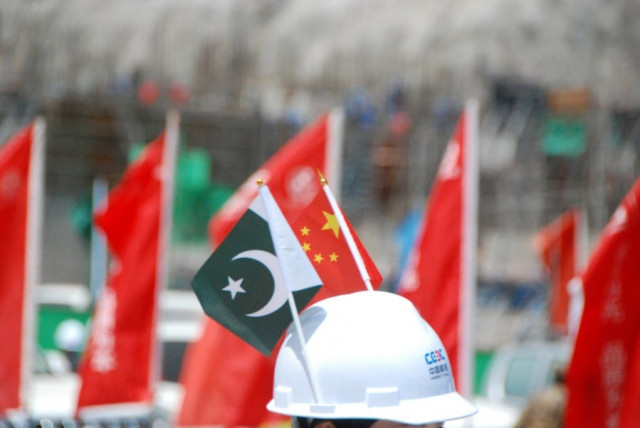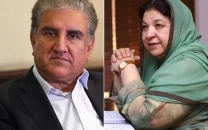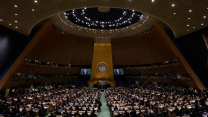Pakistanis cherish deep-rooted friendship with China
Friday (May 21) marked the 70th anniversary of the establishment of the bilateral diplomatic relations

The Pakistan-China diplomatic relations were established 70 years ago and with the passage of time, the friendship between the two countries has flourished in the hearts of the peoples of both countries.
Friday marked the 70th anniversary of the establishment of the bilateral relations and Pakistani officials, experts and the general public believe that the deep-rooted friendship is growing day by day and every coming generation cherishes the friendship even more than the previous one.
Now, many Pakistanis celebrate Chinese festivals like the Chinese New Year in their homes and schools every year, and many others get economic benefits from the growing economic cooperation between the two countries, which bear witness to the strengthening of relations.
Addressing a ceremony on Friday, Prime Minister Imran Khan termed the friendship between the two countries a unique example in the world, which is more than just diplomatic ties and rests in the hearts of the Pakistani people despite cultural and language differences.
"Pakistanis believe that China is a friend which will always stand by them in their hard times, which developed an emotional association in their hearts with China," PM Imran said.
Pakistani officials who witnessed Pakistan-China relationship from the early 1950s believe that the strong partnership of both multi-dimensional and geostrategic character has evolved over the years because the relationship was based on the strong love and affection of the people of the two countries for each other.
Sartaj Aziz, a retired diplomat and former de-facto foreign minister of Pakistan, has been to China for various official visits since the 1960s, and over the years he has seen development of strong diplomatic relations which paved the way for an even stronger people-to-people contact and business relations.
Read more: CPEC bears fruit amid 70th anniversary of Pak-China ties
"The people-to-people relationship started flourishing in the 1960s and 1970s when a large number of delegations from both countries started visiting each other every year. Later, Chinese scholarships, Pakistani students, as well as sports and cultural activities also enhanced the relations," Aziz told Xinhua.
After initiation of the China-Pakistan Economic Corridor (CPEC) in 2013, the investment level of Chinese companies and banks increased in Pakistan, and Chinese people started coming to Pakistan for infrastructural development which also gave a lot of employment and business opportunities to local people, Aziz said.
"CPEC has become a household name in Pakistan after CPEC projects addressed the electricity crisis of Pakistan," he added.
For Pakistani students who are studying in China, they are acting as ambassadors of both countries as during their stay in China they represent Pakistan and after coming back they represent China.
Badiea Shaukat, 38, an Islamabad-based economic consultant, is an alumnus of the Shanghai Jiao Tong University and during his stay in China from 2013 to 2019, he witnessed that the love and friendship of the Pakistani people for their Chinese brothers are reciprocal.
"I saw Pakistani people including myself and my family cherishing Pakistan-China friendship since my childhood, and when I went to study in China on a fully-funded scholarship, I realised that the affection and respect between the peoples of the countries are mutual," he said.
He said that when he joined his alma mater in 2013 after switching off from an academic course from Germany due to better ranking of the Chinese university, there were only 60-70 Pakistani students in the whole campus and when he left, there were more than 600, indicating the more people-to-people contacts and opportunities provided by the Chinese universities to Pakistani students.
"I believe the scholarship opportunity and the good education I got from China is only because I am a Pakistani and my country is a close friend of China, so like many other Pakistanis, I got benefit due to the friendship of the both countries," he added.
Some Pakistani schools are passing Pakistan-China friendship to the younger generations by introducing Chinese language in their curriculum to give young kids a better understanding of the Chinese language and culture.
Sabina Zakir, director for language, outreach and communication in the Millennium Education of Pakistan, told Xinhua that over 8,500 students from grade three to seven are currently studying Chinese language at their schools to have a better understanding of China whereas over 30,000 already graduated from the school after studying the language.
"We always knew that China and Pakistan relationship is higher than the Himalayas and sweeter than honey and deeper than oceans, and we realized that language is a great barrier between the people of our two countries so we decided to remove it by starting mandatory Chinese language classes for our students, and it really made an impact."
She said that Pakistanis including small kids know that China always supports Pakistan in thick and thin. "We know that China has always been there for us so we want to give respect to our Chinese brothers by giving a chance to our future generation to have a better understanding of the Chinese culture and language."
Chinese embassy holds online reception
On Friday, the Chinese Embassy in Pakistan held an online reception to celebrate the anniversary.
Read more: Pakistan, China promise high quality development of CPEC
President Arif Alvi, Chairman Senate Sadiq Sanjrani, Chairman of Joint Chiefs of Staff Committee Nadeem Raza and Chinese Ambassador to Pakistan Nong Rong attended the virtually held reception.
On the occasion, Alvi said that the establishment of diplomatic ties seven decades ago was a "watershed moment" for both of the countries, adding that the ironclad friendship between Pakistan and China has been time-tested and growing stronger.
The two countries have conducted all-round cooperation, the president said. "Our cooperation in the fields of agriculture, trade, finance, education, science and technology, and people-to-people or cultural exchanges is strengthening and growing day by day."
The CPEC, a flagship project of the China-proposed Belt and Road Initiative, has solved the electricity shortage problem in Pakistan and will further promote the country's industrialisation to create more jobs, Alvi noted.
Looking into the future, the president said the solid foundations of the all-weather strategic cooperative partnership ensure that the bilateral relations will be stronger and the special friendship will be passed on to the next generations.
Pakistan firmly supports forging a closer China-Pakistan community with a shared future in the new era, the president said, adding that the two countries will jointly lead the world towards peace and prosperity.
Addressing the reception, Nong said the China-Pakistan relations have been progressing no matter how the regional and international landscapes have evolved, and the friendly and pragmatic cooperation between the two countries have made fruitful achievements.
"The past seven decades have also been the journey of mutual assistance in addressing various challenges," the Chinese envoy said, adding that collaboration and mutual support between the two countries in the face of the pandemic have set an example of international cooperation in addressing the pandemic.
"It has been proved that China-Pakistan friendship and cooperation are not only in the fundamental interests of the two countries and peoples, but are also conducive to regional and global peace, stability and development," Nong said.
On May 21, 1951, China and Pakistan established diplomatic ties. Pakistan was one of the first countries to recognise new China and the first Islamic country to enter into diplomatic relations with China.



















COMMENTS
Comments are moderated and generally will be posted if they are on-topic and not abusive.
For more information, please see our Comments FAQ